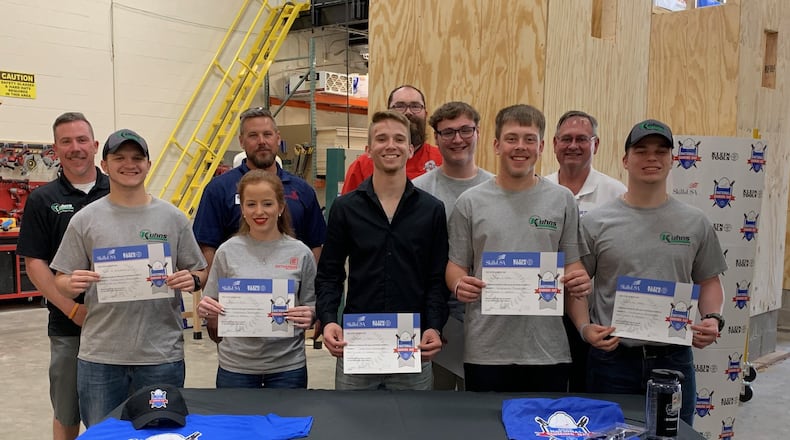RELATED: Teacher/grad student gives tips on starting college
Tyler Blankenship, Ryan Hiles, Devin Hasty, Austin Perkins have jobs with the Kuhns Group, Kayla Ellis signed on with Enterprise Roofing, and Connor Delili will work for Ferguson Construction, where he’s already been an intern.
“I’ve been working with Ferguson all year,” Delili said. “I’ve been doing some masonry stuff, putting up doors, and recently I’ve been putting up skylights for the Emerson building up in Sidney.”
Delili and Hasty both said McGhee had been harping on them the past two years to consider all the job opportunities in construction.
Blankenship said he hopes to stay in the construction field as a lifelong career. He said Kuhns — a general contractor focused on restaurant construction — offers a lot of benefits and has a family feel for taking care of employees.
RELATED: Area needs more technically skilled employees
“When I first presented my opportunity to my family, they were telling me how construction is a young man’s job, and I wouldn’t be able to go very far, and it would put wear and tear on my body, and college was the way to go,” Blankenship said. “But I felt if I can go learn a trade and really master it, then I felt like college wasn’t really necessary now. Eventually, I would like to go to college, but I’m trying to stay out of the debt portion of it.”
That debt argument is a frequent refrain of local career tech educators, who point to the numerous jobs available for skilled tradespeople in the Dayton area, usually with a training cost much lower than the four-year college degree route.
Recent studies show roughly two-thirds of new college graduates in America come out with at least some student debt, and of those with debt, the average amount is close to $30,000. Some conquer that debt fairly quickly by landing jobs in high-demand fields, but others struggle for years to pay it off.
Jesse Maxfield, career tech director at Stebbins, said it’s not an either-or decision of college vs. career, because every student should be focused on the career question, with college one way to get there.
RELATED: Inspiring Fairmont grad “writing her own story”
“We have to do our best to prepare the students for whatever that next step may be and allow them to gain those experiences while they’re in high school so they are more prepared to make a wise choice, whatever it is — entering the workforce immediately, or going off to college to eventually enter the workforce, or going into the military,” Maxfield said.
Of the Signing Day group, Ellis was most focused on college, saying she plans to get a business management degree from Sinclair, “so I’ll eventually be more on the business side of things.”
Perkins said Stebbins staff helped him stay on top of all of his academics, not just the construction program, and motivated students by showing them multiple opportunities. Blankenship agreed, saying the school taught problem-solving, so students wouldn’t be lost in the real world.
“Our construction class built a whole ‘tiny house’ from the trailer up,” he said. “McGhee did not let us slack at all. He was able to instill a work ethic in us, so that when we get out into the field, we can surprise some people instead of having to be retrained.”
RELATED: See photos, bios of top local students
The graduates encouraged younger students to try all the opportunities Stebbins has, even if it just means finding out what they don’t like, to weed out some possible careers. Perkins was happy that he’s past that point, though.
“It’s reassuring to know what I’m going to do for the next at least five years,” Perkins said. “I have a plan already in place and something to keep me steady for years while everyone else is just figuring out what they’re going to do.”
About the Author

